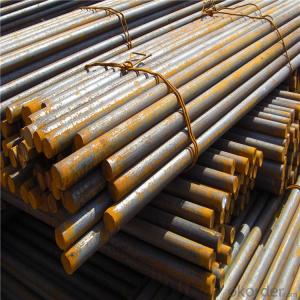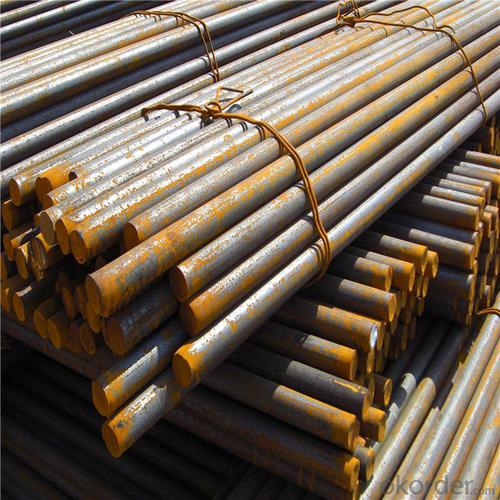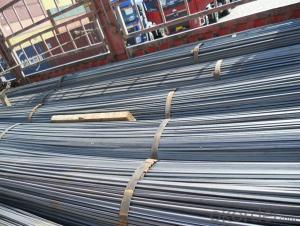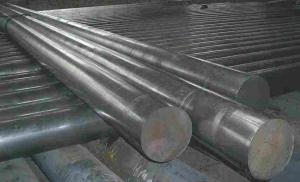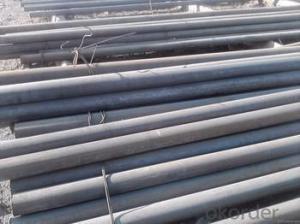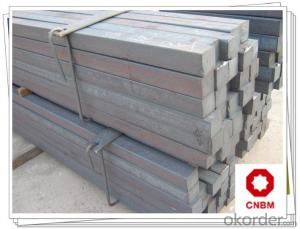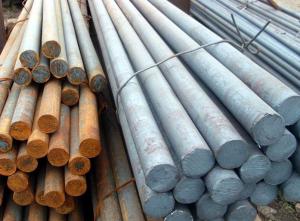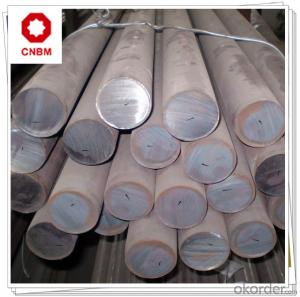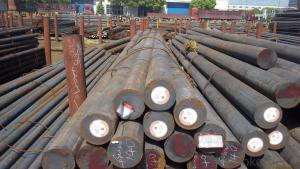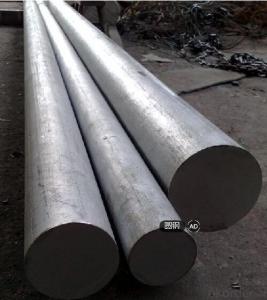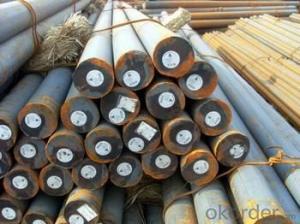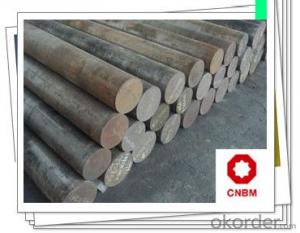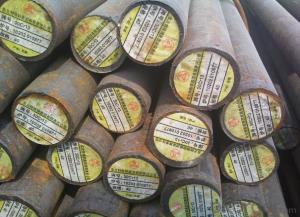A36 Steel Round Bar Round Bar EN19 ST37-2 Steel Round Bar
- Loading Port:
- Tianjin
- Payment Terms:
- TT OR LC
- Min Order Qty:
- 100 m.t.
- Supply Capability:
- 500000 m.t./month
OKorder Service Pledge
OKorder Financial Service
You Might Also Like
Specification
A36 Steel Round Bar Round Bar EN19 ST37-2 Steel Round Bar
Product Description of A36 Steel Round Bar Round Bar EN19 ST37-2 Steel Round Bar
1. Steel grade: ASTM4140, SCM440, 42CrMo, DIN1.7225
2. Length: 6M-12M
3. Diameter: 16mm-300mm
4. Product range: round bar, flat bar, square bar
5. Technique: Hot rolled, forged, cold drawn
Specification of A36 Steel Round Bar Round Bar EN19 ST37-2 Steel Round Bar
Material | SCM4140 | Round bar | Dia(mm) | 16-300mm |
Process | EAF + LF + VD + Forged + Heat Treatment (optional) | Length (mm) | Max 12m | |
Heat treatment | Normalized / Annealed / Quenched / tempered | Flat bar | Thickness(mm) | 8-500mm |
Delivery condition | Hot forged +Rough machined (black surface after Q/T)+ Turned (optional) | Width(mm) | 70-200mm | |
Test | Ultrasonic test according to SEP 1921-84 D/d | Length (mm) | Max 12m |
Chemical Composition of A36 Steel Round Bar Round Bar EN19 ST37-2 Steel Round Bar
C | Si | Mn | Cr | Mo | P | S |
0.38~0.43 | 0.15~0.35 | 0.75~1.00 | 0.8~1.1 | 0.15~0.25 | ≤0.035 | <0.04< td=""> |
Photo Show of A36 Steel Round Bar Round Bar EN19 ST37-2 Steel Round Bar
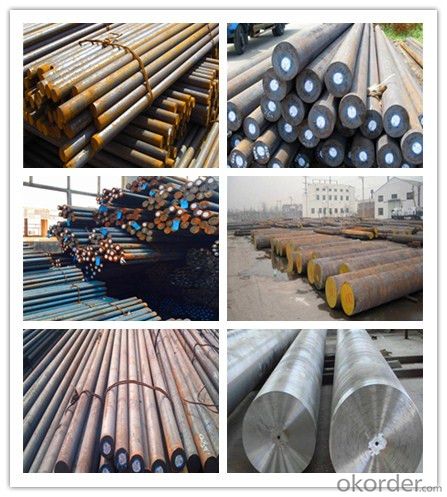
Packing and Delivery:
Packing in bundle package, or as customer's requirements.
Delivery Detail: 45 days after receiving the deposit.
Usage and Applications of A36 Steel Round Bar Round Bar EN19 ST37-2 Steel Round Bar
1. Steel round bar is used in a large number of architectural and engineering structures. Or it can be used in construction of plants for the production of steel house frames, high-voltage transmission towers, bridges, vehicles, boilers, containers, ships, etc.
2. And we can use this kind of product on the performance of the mechanical parts if the demand is not very high.
3. Some special material steel round bar can be used for main shaft of steamer, hummer shank, with big section and supper force.
Company Information
CNBM International Corporation is the most important trading platform of CNBM group.
Whith its advantages, CNBM International are mainly concentrate on Cement, Glass, Iron and Steel, Ceramics industries and devotes herself for supplying high qulity series of refractories as well as technical consultancies and logistics solutions.


F A Q
1, Your advantages?
professional products inquiry, products knowledge train (for agents), smooth goods delivery, excellent customer solution proposale
2, Test & Certificate?
SGS test is available, customer inspection before shipping is welcome, third party inspection is no problem
3, Factory or Trading Company?
CNBM is a trading company but we have so many protocol factories and CNBM works as a trading department of these factories. Also CNBM is the holding company of many factories.
4, Payment Terms?
30% TT as deposit and 70% before delivery.
Irrevocable L/C at sight.
5, Trading Terms?
EXW, FOB, CIF, FFR, CNF
6, After-sale Service?
CNBM provides the services and support you need for every step of our cooperation. We're the business partner you can trust.
For any problem, please kindly contact us at any your convenient time.
We'll reply you in our first priority within 24 hours.
- Q: What are the advantages of using tool steel round bars?
- Tool steel round bars offer several advantages: 1. High hardness: Tool steel round bars have exceptional hardness, making them ideal for applications that require resistance to wear, abrasion, and deformation. This property ensures longevity and durability of the tool. 2. Excellent machinability: Tool steel round bars are known for their excellent machinability, meaning they can be easily shaped, cut, and formed into various tool designs. This enhances the versatility and precision of the tool. 3. Superior strength and toughness: Tool steel round bars possess exceptional strength and toughness, enabling them to withstand high impact and shock loading. This makes them suitable for heavy-duty applications where tools are subjected to intense pressure and stress. 4. Good heat resistance: Tool steel round bars exhibit excellent heat resistance, allowing them to retain their hardness and strength even at high temperatures. This characteristic is crucial for tools used in applications involving heat treatment, forging, and molding. 5. Corrosion resistance: Many tool steel alloys contain elements such as chromium, vanadium, and molybdenum, which enhance their corrosion resistance. This makes tool steel round bars suitable for applications in corrosive environments, ensuring longevity and performance. 6. Precise dimensional accuracy: Tool steel round bars are manufactured to precise dimensional tolerances, ensuring uniformity and consistency in their shape and size. This level of accuracy is crucial for ensuring the proper fit and functionality of the tool. Overall, the advantages of using tool steel round bars lie in their hardness, machinability, strength, heat resistance, corrosion resistance, and dimensional accuracy, making them a preferred choice for various tooling applications.
- Q: What are the advantages of using nickel-chromium-molybdenum alloy steel round bars?
- The advantages of using nickel-chromium-molybdenum alloy steel round bars include high strength, excellent corrosion resistance, good toughness, and superior heat resistance. These properties make the alloy steel bars ideal for applications in industries such as aerospace, oil and gas, and chemical processing, where durability and reliability are crucial. Additionally, the alloy's resistance to oxidation and high-temperature environments makes it suitable for use in high-stress applications, such as turbine engine components and pressure vessels.
- Q: What are the advantages of using magnesium-alloy steel round bars?
- There are several advantages of using magnesium-alloy steel round bars: 1. Lightweight: Magnesium is one of the lightest structural materials available, making magnesium-alloy steel round bars significantly lighter than traditional steel bars. This makes them ideal for applications where weight reduction is crucial, such as aerospace and automotive industries. 2. High strength-to-weight ratio: Despite being lightweight, magnesium-alloy steel round bars have a high strength-to-weight ratio. This means they can withstand high loads and provide excellent structural integrity while still maintaining a low weight. 3. Corrosion resistance: Magnesium-alloy steel round bars have excellent corrosion resistance properties, making them suitable for outdoor and marine applications. They can withstand exposure to saltwater, humidity, and other corrosive environments without significant degradation. 4. High machinability: Magnesium-alloy steel round bars are known for their superior machinability, allowing for easy shaping, cutting, and drilling. This makes them desirable in industries that require precise and complex component manufacturing. 5. Good heat dissipation: Magnesium has excellent thermal conductivity, which means that magnesium-alloy steel round bars can effectively dissipate heat. This makes them suitable for applications where heat management is critical, such as in heat sinks for electronic devices or engine components. 6. Eco-friendly: Magnesium is a highly recyclable material, and using magnesium-alloy steel round bars can contribute to a more sustainable and environmentally friendly manufacturing process. The ability to recycle and reuse magnesium alloys minimizes waste and reduces the overall environmental impact. 7. Cost-effective: While magnesium alloys may have a higher initial cost compared to traditional steel, their lightweight nature can lead to significant cost savings in transportation and installation. Additionally, their corrosion resistance and durability reduce the need for frequent maintenance and replacement, further lowering long-term costs. In conclusion, the advantages of using magnesium-alloy steel round bars include their lightweight nature, high strength-to-weight ratio, corrosion resistance, high machinability, good heat dissipation, eco-friendliness, and cost-effectiveness. These properties make them a desirable choice for various industries, particularly those that prioritize weight reduction, performance, and durability.
- Q: What is the typical price range for steel round bars?
- The typical price range for steel round bars varies depending on factors such as size, grade, and market conditions. However, generally speaking, steel round bars can range in price from $0.50 to $10 per pound.
- Q: What are the advantages of using steel round bars in construction?
- There are several advantages of using steel round bars in construction. Firstly, steel round bars offer exceptional strength and durability, making them ideal for supporting heavy loads and withstanding harsh weather conditions. Secondly, they are highly resistant to corrosion, ensuring long-lasting and low-maintenance structures. Additionally, steel round bars can be easily customized and shaped to fit various construction needs, allowing for flexibility in design. Lastly, steel round bars are readily available and cost-effective, making them a preferred choice for construction projects.
- Q: How do steel round bars compare to aluminum or steel tubing?
- Each material, steel round bars, aluminum tubing, and steel tubing, possesses distinct properties and applications. Therefore, it is crucial to comprehend the characteristics of each material prior to making a comparison. Steel round bars consist of solid cylindrical bars crafted from steel. Renowned for their strength and durability, they are suitable for heavy-duty applications. These bars exhibit exceptional tensile strength and can withstand significant levels of stress and pressure. Consequently, they find extensive use in construction, manufacturing, and engineering projects where strength and structural integrity are paramount. Moreover, steel round bars exhibit high resistance to corrosion, rendering them appropriate for outdoor and marine applications. In contrast, aluminum tubing is constructed using lightweight and corrosion-resistant aluminum. This material is recognized for its outstanding thermal and electrical conductivity. It is commonly employed in applications where weight reduction is crucial, such as in the aerospace and automotive industries. Additionally, aluminum tubing is frequently utilized in the construction of heat exchangers and electrical wiring systems due to its conductivity properties. Steel tubing, similar to steel round bars, is composed of steel, but it possesses a hollow structure. Known for its versatility and wide range of applications, steel tubing is available in various shapes and sizes, such as round, square, and rectangular, enabling the creation of diverse structural designs. Construction, automotive manufacturing, and industrial applications frequently employ steel tubing due to its high strength and rigidity, which make it suitable for applications necessitating structural support or the ability to endure heavy loads. When comparing the three materials, steel round bars outperform aluminum and steel tubing in terms of strength and durability. Consequently, they are ideal for heavy-duty applications that demand substantial strength and structural integrity. However, steel round bars may be heavier and more costly than aluminum tubing, which is often favored for lightweight applications. Conversely, steel tubing offers versatility in shape and size, permitting greater design options. Ultimately, the selection between steel round bars, aluminum tubing, and steel tubing hinges on the specific requirements of the application, including factors such as strength, weight, cost, and corrosion resistance. It is essential to meticulously evaluate these factors and seek advice from experts to determine the most suitable material for a given project.
- Q: Can steel round bars be used in the production of telecommunications equipment?
- Yes, steel round bars can be used in the production of telecommunications equipment. Steel is a versatile material that offers strength and durability, making it suitable for various applications, including telecommunications equipment. Steel round bars can be used to create structural components, connectors, brackets, and supports, among other parts required in the production of telecommunications equipment.
- Q: Can steel round bars be coated with protective coatings?
- Yes, steel round bars can be coated with protective coatings. These coatings serve as a barrier to protect the steel from corrosion, abrasion, and other forms of damage. The most common type of protective coating used on steel round bars is called a corrosion-resistant coating. This coating is typically applied through processes such as hot-dip galvanizing, electroplating, or powder coating. These coatings provide a layer of protection that prevents the steel from coming into contact with corrosive substances, moisture, and other environmental factors that may cause deterioration. Additionally, protective coatings can also enhance the appearance of the steel round bars and increase their lifespan.
- Q: How are steel round bars used in the construction of transmission towers?
- Transmission towers commonly use steel round bars due to their strength, durability, and ease of fabrication. These bars, typically made from high-strength carbon steel, come in various diameters to meet different structural needs. In transmission tower construction, steel round bars serve as the primary structural elements. They form the vertical and diagonal members that provide strength and stability to the tower. The bars are connected using welding or bolted connections to create the lattice structure of the tower. The round shape of the bars allows for even distribution of forces, making them ideal for handling the loads and stresses experienced by transmission towers. These loads include the tower's weight, electrical conductors, and environmental factors like wind, ice, and seismic forces. Moreover, steel round bars offer excellent corrosion resistance, which is crucial for transmission towers exposed to harsh weather conditions. This resistance helps extend the tower's lifespan and ensures the safety and reliability of the transmission lines. Additionally, steel round bars can be easily fabricated and customized to meet the specific design requirements of the transmission tower. They can be cut, bent, and shaped to the desired dimensions, providing flexibility in tower design and construction. In conclusion, steel round bars play a crucial role in the construction of transmission towers by providing strength, durability, and corrosion resistance. Their versatility and ability to withstand various loads make them an essential component in ensuring the safe and reliable transmission of electricity.
- Q: What are the advantages of using carbon-manganese alloy steel round bars?
- There are several advantages of using carbon-manganese alloy steel round bars: 1. Strength and durability: Carbon-manganese alloy steel round bars offer high levels of strength and durability, making them suitable for use in demanding applications. They can withstand heavy loads and resist deformation, ensuring long-lasting performance. 2. Impact resistance: Carbon-manganese alloy steel round bars have excellent impact resistance, making them highly suitable for applications where there is a risk of impact or sudden loads. This property helps prevent fractures or breakages, enhancing safety and reliability. 3. Weldability: Carbon-manganese alloy steel round bars have good weldability, allowing for easy fabrication and joining. They can be easily welded using common techniques, making them versatile and cost-effective for various construction projects. 4. Corrosion resistance: Carbon-manganese alloy steel round bars exhibit good corrosion resistance, making them suitable for use in environments where exposure to moisture or corrosive substances is a concern. This property helps to extend the lifespan of the bars and reduces the need for frequent maintenance and replacement. 5. Cost-effective: Carbon-manganese alloy steel round bars are generally more cost-effective compared to other high-strength steel options. They offer a balance between strength and affordability, making them a cost-efficient choice for applications where high-strength materials are needed without excessive costs. 6. Machinability: Carbon-manganese alloy steel round bars are relatively easy to machine, allowing for precise shaping and finishing. This property makes them suitable for applications that require complex or custom designs. Overall, the advantages of using carbon-manganese alloy steel round bars include their strength, durability, impact resistance, weldability, corrosion resistance, cost-effectiveness, and machinability. These properties make them a reliable and versatile choice for a wide range of applications in industries such as construction, automotive, and manufacturing.
Send your message to us
A36 Steel Round Bar Round Bar EN19 ST37-2 Steel Round Bar
- Loading Port:
- Tianjin
- Payment Terms:
- TT OR LC
- Min Order Qty:
- 100 m.t.
- Supply Capability:
- 500000 m.t./month
OKorder Service Pledge
OKorder Financial Service
Similar products
Hot products
Hot Searches
Related keywords
